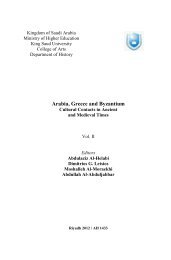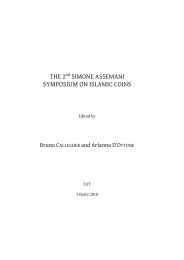ulum-al-quran
ulum-al-quran
ulum-al-quran
Create successful ePaper yourself
Turn your PDF publications into a flip-book with our unique Google optimized e-Paper software.
The first so c<strong>al</strong>led sura entitled <strong>al</strong>-kh<strong>al</strong>' (separation), translates as follows: 'O Allah, we seek your help<br />
and ask your forgiveness, and we praise you and we do not disbelieve in you. We separate from and<br />
leave who sins against you.'<br />
The second so-c<strong>al</strong>led sura, entitled <strong>al</strong>-hafd (haste) translates as follows: 'O Allah, we worship You and to<br />
You we pray and prostrate and to You we run and hasten to serve You. We hope for Your mercy and we<br />
fear Your punishment. Your punishment will certainly reach the disbelievers.' Obviously these two pieces<br />
constitute so-c<strong>al</strong>led 'qunut', i.e. supplications which the Prophet sometimes said in the morning prayer or<br />
witr prayer after recitation of suras from the Qur'an. They are in fact identic<strong>al</strong> to some parts of qunut<br />
reported in the collections of hadith. See: Nawawi, <strong>al</strong>-adhkar, Cairo, 1955, pp. 57-8.<br />
As to the single addition<strong>al</strong> so-c<strong>al</strong>led aya, its translation is as follows: 'If the son of Adam was given a<br />
v<strong>al</strong>ley full of riches, he would wish a second one, and if he was given two v<strong>al</strong>leys full of riches, he would<br />
surely ask for a third one. Nothing will fill the belly of the son of Adam except dust, and Allah is forgiving<br />
to him who is repentant. '<br />
Again this text is known to be a hadith from the Prophet. See Bukhari, VIII, No. 444-47. According to Ibn<br />
'Abbas (No. 445) and 'Ubay (No. 446) this text was at times thought to be part of the Qur'an. However<br />
Ubay himself clarifies that after sura 102: I had been reve<strong>al</strong>ed, they (i.e. the sahaba) did not consider the<br />
above to be part of the Qur'an. See Bukhari, VIII, No. 446. This explanation of Ubay <strong>al</strong>so makes it very<br />
clear that the Companions did not differ at <strong>al</strong>l about what was part of the Qur'an and what was not part<br />
of the Qur'an. when the revelation had ceased. and if e.g. this hadith occurred in the mushaf of Ubay, it<br />
was a mushaf for his own person<strong>al</strong> use, in other words, his private notebook, where he did not <strong>al</strong>ways<br />
distinguish between Qur'anic materi<strong>al</strong> and hadith, since it was not meant for gener<strong>al</strong> use and he himself<br />
knew well what to make of his own notes. The same is true of the other copies of the Qur'an, which<br />
some of the Companions had for their own person<strong>al</strong> use. Also those who transmitted to us the reports<br />
about these copies of the Qur'an of the Companions have only narrated to us the various differences<br />
which occurred there according to reports that reached them (e.g. the hadith in Bukhari, VIII, No. 446<br />
that Ubay at some early stage held this sentence to be part of the Qur'an). However the actu<strong>al</strong><br />
manuscripts of these copies of the Qur'an of the Companions have not come down to us, since <strong>al</strong>l of<br />
them agreed on the correctness and v<strong>al</strong>idity of the copies which 'Uthman had arranged to be written and<br />
distributed for gener<strong>al</strong> use. Hence their own person<strong>al</strong> notebooks became obsolete and were destroyed.]<br />
The order of the suras is again different from 'Uthman as well as Ibn Masud.<br />
The following is the order of suras in the copy attributed to Ubay b. Ka'b: [Fihrist, I, pp. 58-60.]<br />
1, 2, 4, 3, 6, 7, 5, 10, 8, 9, 11, 19, 26, 22, 12, 18, 16, 33, 17, 39, 45, 20, 21, 24, 23, 40, 13, 28, 27, 37,<br />
38, 36, 15, 42, 30, 43, 41, 14, 35, 48, 47, 57, 52, 25, 32, 71, 46, 50, 55, 56, 72, 53, 68, 69, 59, 60, 77,<br />
78, 76, 75, 81, 79, 80, 83, 84, 95, 96, 49, 63, 62, 66, 89, 67, 92, 82, 91, 85, 86, 87, 88, 74, 98, 61, 93,<br />
94, 101, 102, 65, 104, 99, 100, 105, , 108, 97, 109, 110, 111, 106, 112, 113, 114.<br />
Again, as in the case of Ibn Mas'ud above this list is incomplete and does not contain <strong>al</strong>l 114 suras of the Qur'an.<br />
'Ubay has a tot<strong>al</strong> of 93 variants in Sura <strong>al</strong>-baqara. [Again taken as example only to illustrate the point.] Very often, his<br />
readings are similar to those of Ibn Mas'ud. For example, he reads <strong>al</strong>-baqara in 2:70 as <strong>al</strong>-baqira. So does Ibn Mas'ud.<br />
The Mushaf of Ibn 'Abbas (d. 68H/687)<br />
Ibn 'Abbas <strong>al</strong>so wrote a mushaf, which according to the Itqan [I, p. 65; Ibn Abi Dawud, masahif, p. 193.] <strong>al</strong>so included<br />
the two addition<strong>al</strong> suras which Ubay had. Again his arrangement of the suras differed from the other copies. In Sura <strong>al</strong>baqara,<br />
he has a tot<strong>al</strong> of 21 variants, some of them identic<strong>al</strong> with Ibn Mas'ud and Ubay as well as other Companions.<br />
Some other Companions<br />
According to the Itqan [I, p. 65; Ibn Abi Dawud, masahif, p. 210.] the mushaf of Abu Musa <strong>al</strong>-Ash'ari (d. 44H/664)<br />
contained the same materi<strong>al</strong> as Ubay had.<br />
There is only one variant reported from him in Sura <strong>al</strong>- baqara, namely that he read Ibraham in place of Ibrahim.<br />
Hafsa (d. 45H/665) had three variants in the same sura, and Anas b. M<strong>al</strong>ik (d. 91H/709) had five.





